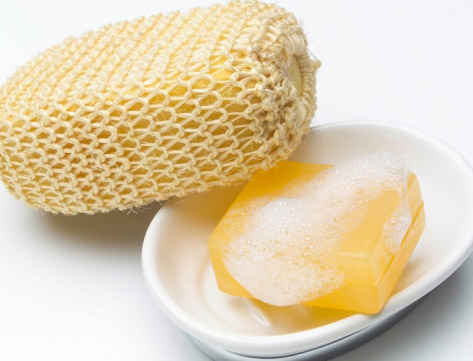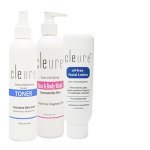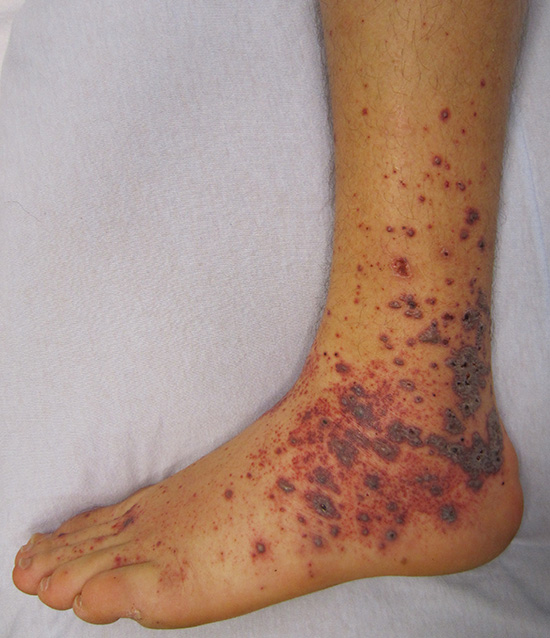Hypoallergenic Soaps
Which hypoallergenic soaps will work well to clean your sensitive skin without causing dryness, irritation or skin inflammation? Learn which ingredients to avoid, which oils are best for sensitive skin, and how to choose the gentlest ingredients.
The First Natural Soaps
In days of old, soap was made from plants such as the Soap Plant, Soapbark, Soapberry or Soapwort. These plants all contain saponin which is a natural chemical compound found in many plants, and also found in some marine life.
Saponins can be found in all parts of the plant, including the leaves, stems, roots, fruits and flowers. The roots of the Soap Plant can be crushed in water, to form a nice lather that can even be used as a shampoo!
Nowadays, soap is made by combining different types of fats and oils with lye, also known as sodium hydroxide. The chemical reaction that takes place between the oils and the lye is called saponification, and this creates the soaps we know of today.
Why Can Soap Irritate Your Skin?
In the process of saponification, the lye is completely absorbed, however if the soap is made incorrectly, or used too quickly before saponification is fully complete, there can be traces of lye in the soap which will cause skin irritation.
Most commercial soaps also contain fragrances, dyes and preservatives which can cause skin irritation and allergic reactions. Some hypoallergenic soaps simply remove the fragrances and colors, but still use irritating chemicals to preserve the soap or increase its cleaning power.
It is important to check the ingredients on any hypoallergenic soap to make sure that there aren't any hidden fragrances, colorings, preservatives or ingredients that may cause your sensitive skin to break out!
Oils Used for Making Soaps
Hypoallergenic soaps generally use plant based oils in their soaps, and they try to use fewer ingredients rather than a large number of different kinds of oils.
Hard Soaps - Soaps made from tallow, lard or palm oil tend to be harder in consistency, and they resist dissolving unlike the softer and creamier soaps.
The down side of using tallow or lard is that these are animal products which cause irritation for sensitive skin. Tallow may cause eczema and blackheads. I personally choose to not use animal products unless I absolutely must for some medical reason.
Lathering Soaps are made with coconut oil, palm oil, or castor oil.
Moisturizing Soaps contain plant oils such as olive, soybean, canola or sunflower oil.
Luxury Soaps The really creamy and luxurious soaps contain such ingredients as shea butter, cocoa butter, almond oil, jojoba oil, or hemp oil.
Most vegetable based oils work best for sensitive skin, however I STILL recommend that you skin test any hypoallergenic soaps before using them on your face.
To skin test, simply apply a little soap to the inside of your arm, or behind your ear. Wait a few hours or a day to see how your skin reacts.
How Soap is Made
Soap recipes blend different fats together to achieve the desired result. Lye is added to the mixture, and when it begins to harden, extra ingredients such as herbs, colors or fragrance are added. Good quality hypoallergenic soaps will not add these extras in order to avoid irritants.
Then the soap mixture is poured into molds and it continues to generate heat. Although the soap is hard enough to be cut into bars within a day, it needs several weeks to continue the saponification process. This is important so that the lye can finish its process of reacting with the oils.
Usually this process creates a mixture that is 75% soap and 25% glycerin. Glycerin acts as a skin softener and most homemade soaps simply leave the glycerin in the soap to soften the skin. commercial soaps often remove the glycerin and sell it separately.
A super fatted soap contains extra fats so that there is sure to be no extra lye left over to irritate the skin. This also makes the soap smoother on the skin and easier to cut.
Isn't Lye Toxic?
Yes, I had this question too, as Lye is very toxic and will burn the skin! In the process of soap making, the lye interacts with the fats and is eventually completely absorbed, IF the process of saponification is done correctly and allowed to complete itself.
This process takes several weeks at least, and it is very important that ALL the lye be completely absorbed so that you don't have any leftover Lye hanging around.
For this reason, it is important to buy soaps from a reputable manufacturer. If you are using homemade soaps, be SURE that whoever is making the soap is experienced enough to know what they are doing!
Common Chemicals Added to Soap
I prefer whenever possible to use hypoallergenic soaps with natural ingredients. You will find that both regular and hypoallergenic soaps do have some chemicals added to them.
Which ones are hazards to your sensitive skin? Here is a short list of some ingredients commonly found in soaps.
Low Hazard Ingredients
These chemicals are not known to cause a great deal of skin irritation.
Polyethelene Glycols such as PEF-6 methyl ether are added to soaps provide thickening, to improve the blending or as detergents. These generally are not known to be toxic.
Tetrasodium etidronate, Pentasodium pentetate, and tetradsodium EDTA are added to soften the water and prevent the formation of soap scum. They also are used in non-hypoallergenic soaps to protect the added dyes and perfumes from the effect of metal ions in the soap mixture.
Detergent chemicals such as sodium isethionate and sodium cocoyl isethionate are added to some soaps to increase their cleaning power.
Moderately Hazardous Ingredients
I recommend you avoid these ingredients in soap or any other product.
Cocamidopropyl Betain has been linked in research to allergies, immune system impairment, and possible contamination with nitrosamines. In addition it has been shown to cause toxic reactions to wildlife.
Sodium Lauryl Sulfate is a known skin irritant that is a lathering agent used in many soaps, shampoos, toothpastes and facial cleansers. Research has linked SLS to organ system and reproductive system toxicity and cancer.
High Hazard Ingredients
If you have sensitive skin, you will definitely want to avoid these!
BHT is frequently added as a preservative to soaps, and I think everyone should avoid this, even if you don't have sensitive skin.
According to the National Library of Medicine, BHT is a Known human immune system toxicant and there is strong evidence that it is also a human skin toxicant. Research has linked BHT to a whole host of endocrine, immune system, neurological and organ system problems.
Fragrance is frequently added to soaps which is a high hazard for sensitive skin and can cause allergies, skin irritation, neurotoxicity and immune system impairment.
Artificial colorings - these are made from plant, animal, insect and synthetic sources. Many artificial colors are coal tar derivatives that are tested on animals because of their cancer causing properties.
How to Find Hypoallergenic Soaps
That Will Not Irritate Sensitive Skin
Which hypoallergenic soaps are best for sensitive skin? How do you find the good ones?? Sometimes the only way to know is to give them a try.
A good hypoallergenic soap will clean your skin without drying. Here are some tips to choose one that will work best for your sensitive skin.
- Use hypoallergenic soaps with fewer ingredients
- Avoid fragrances and essential oils
- Avoid preservatives and artificial dyes
- Use soaps made from vegetable oils rather than animal fats
- Avoid using soaps on your face, instead use a hypoallergenic facial cleanser
If you are in doubt about the ingredients in your soap, see our Safe Cosmetics Guide.
My Personal Favorites
I do love trying out new soaps!! So far, these are some of my favorite hypoallergenic soaps:
Hypoallergenic Liquid Soap
Dr. Bronner's Liquid Soap is one of my favorite overall hand and body soaps to use in the shower. I've enjoyed Dr. Bronner's soap since I first discovered the health food store ... way, way, WAY back in my college days! :-)
This is a gentle castile soap with a short list of ingredients which include jojoba and hemp oil, creating a luxurious and creamy lather. They have a fragrance free option available which they call Baby Soap, and several that are scented with essential oils.
Hypoallergenic Salicylate Free Soap
For those who have multiple allergies, or who are allergic to salicylates or looking for salicylate free products, Cleure makes a luscious hypoallergenic hand and body soap and a high quality line of non-toxic hypoallergenic products that work really well.
Hypoallergenic Facial Cleansers
Generally, even a really nice, gentle hypoallergenic soap is too intense for use on the facial skin. I find even very gentle facial cleansers can be too intense for my skin.
I have tried a lot of different facial cleansers and most of them caused my face to break out, even the nice, organic, natural ones.
I've finally found a hypoallergenic facial cleanser that is gentle, that does not irritate my sensitive skin. It is very moisturizing without being greasy, and does not foam or lather at all.
It takes a bit of getting used to if you are used to using a foaming cleanser, until you realize that your face is very pure, fresh and clean after using it.
This cleanser has no added fragrance but the ingredients do have some scent. If you are sensitive to fragrance you may want to start with the sample size. Please see my Cleure skin care review for more details on their facial cleanser.
Home > Hypoallergenic Products > Hypoallergenic Soaps










New! Comments
Share your thoughts about what you just read! Leave me a comment in the box below.